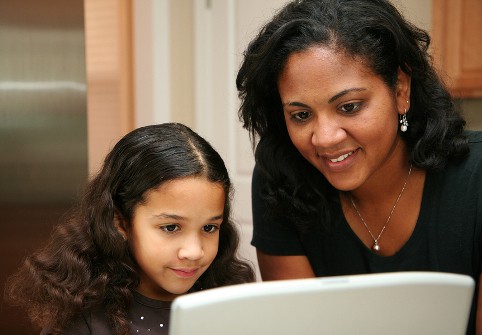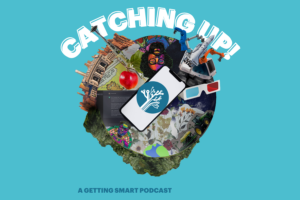Raising Student Bloggers: An Open Letter to Parents

For the past few months, your student, if he or she is in an English class like mine, has plunged head first into the world of blogging. Students have offered up observations about the world, described their passions, and discovered new ideas and information through self-directed research shared with others. This is what writing looks like in the 21st century.
Your student has learned how to find a focus and a voice, to shape thoughts into meaningful statements made up of carefully chosen words, well-crafted sentences, organized paragraphs, insightful images, practical links, and helpful tags. Your student has written to invite commentary and interaction from others and to document the evolution of their thinking. He or she has learned how to extend the conversations raised by blogging peers through thoughtful questioning and commentary. Your student has developed essential skills in modern-day communication.
And we’ve just begun. Now it’s time for you to become more involved in your student’s growth as a learner who actively shares his or her best (and evolving) self with the world.
Talk about Blogs and Blogging
What is your understanding of blogs and blogging? Show your student what it means to be an active participant in the blogosphere by reading blogs together, talking about what goes into them, considering their challenges, and learning more about the way blogs permeate and affect our culture.
If you already read blogs on subjects that interest you and your student, share them. Explain why you read them and what you learn; describe how you achieve balance by looking at multiple viewpoints. Show how you interact with the blog, how you question what is said, how you spin off into new ideas of your own. Explore the ways a blogger makes choices to get an idea across or to make a particular impact on a reader.
Discuss your comfort level with the privacy and professionalism (or lack of it) adopted by the blogs you follow, and show how you might handle similar circumstances. Have a conversation about what it means to be kind and respectful in an online space, why it matters that we should be good digital citizens online (Cyberwise, started by parents of digital-age students, is a great source of information). Remind your student, when necessary, to follow basic practices for online safety (not revealing last names or sharing personal data such as phone numbers, addresses, or when you might be away from home).
If you are not yet a reader of blogs, ask your student about blogging and spend some time seeking out blogs that are related to the activities you enjoy sharing together. Learn from the breadth of writing online how much a blog can do.
Reinforce Learning
Ask how it feels to blog. Talk about a blog’s inherent transparency — what does this mean exactly? Talk about the impact of writing authentically for a real audience who may talk back. How was this different from other kinds of writing your student may do? Discuss your student’s response to taking ownership of their own learning through blogging.
Help your student reflect on what he or she does and how they learn through blogging. How do they make meaning and take risks, and go beyond a mere recitation of content? What results from sharing their passions and interests with others? How do they grow in a personal as well as academic sense? What does your child think about possibly connecting with experts who can further his or her learning? How does a blog allow your student to document their growth or thinking over time?
Now that your student has begun to think of him or herself as a practicing writer, how is he or she improving as a writer? It’s important here to ask for reflections rather than step in and offer your own critique. What does he think he’s doing better? What does she recognize that she needs to work on in order to make her blogs stand out and have the impact on a reader she wants to have? How do they want to experiment in their writing?
Become a Fan
Every writer needs readers, so now it’s time for you to become your blogger’s first fan. Read your student-blogger’s posts and interact in person as well as online. In addition, share their blog with other trusted, nurturing adults. Greg Nadeau offers insights about how parents can support their children’s learning in his 2013 TEDxBeaconStreet Talk, “Blogs and Badges: The Future of Learning.” I like his idea of extending Sugata Mitra’s “Granny Cloud” concept by suggesting that parents select four other adults important in each student-blogger’s life to become loyal readers and responders.
Adult readers should offer essential positive reinforcement for hard work, original ideas, perseverance. It’s important to realize, however, that the child is the one who must put forth the effort, make mistakes, and reap the benefits of learning from experience. Adult readers can also encourage experimentation and engage the student-blogger in conversations about the topic at hand by asking sincere questions that nudge the blogger towards deeper thinking.
Imagine the Bigger Picture
By interacting honestly, responsibly, and supportively with student-bloggers, trusted adults can help student-bloggers grow as writers and thinkers, as communicators who have something of value to add to today’s world. Interacting on a global scale will be a large part of their lives. Helping them understand how to engage productively and creatively with readers beyond the boundaries of their daily experience is a huge gift for today’s students.
By conversing with student bloggers, in person and online, adult readers can learn along with them as they celebrate successes and improve upon mistakes, as they take chances with what they do not know and demonstrate how their learning happens. What better way to stay in touch with them as they grow up? And once they’ve come this far, we can then open up their blogs to the world!
In the long run, an authentic, worldwide audience for blogging can also help students see their work as something worthy of sharing with others — and raise the bar for their online presence overall. Ultimately, those same students can use their blogs as seeds for a digital portfolios that give them room to curate and display the evidence of their learning throughout their lives. What a powerful way for guiding students into the online experts and learners they will become!
For more on student blogging, check out:







Trea Jackson
I agree with every factor that you have pointed out. Thank you for sharing your beautiful thoughts on this. Check this out The Innocent Eyes Of A Child
Thanks!